Report
Long-Term Care Equality Index 2025
Promoting Equitable and Inclusive Long-Term Care and Senior Housing Communities for Lesbian, Gay, Bisexual, Transgender and Queer Residents and their Families

Long-Term Care Equality Index 2025
Table of Contents
Messages from HRC Foundation President
and SAGE Chief Executive Officer

“All 274 participating communities deserve our deepest gratitude for their leadership. Their work sends a powerful message: LGBTQ+ people deserve to age with dignity, safety, and pride in communities that see and understand who they are. The best care is found in communities that embrace our full humanity and lived experiences, from residents to staff and visitors. In these challenging times, our priority is the safety and continued progress in these communities. A vibrant, proud queer community would not exist today without our LGBTQ+ elders. That’s why we refuse to let political hostility undermine the care and dignity LGBTQ+ older adults deserve.”
Kelly Robinson
She/Her/Hers
President, Human Rights Campaign Foundation

“Right now, it’s paramount that we step up and ensure our elders can age on their own terms. Our community is facing increasing uncertainty when it comes to our future — including a menacing federal government, cuts to crucial public services, and a tumultuous economy threatening older adults on fixed incomes. All older Americans, including those who are LGBTQ, deserve to age safely and securely, and one of the best ways to do so is to find welcoming and inclusive places to live and receive care. Today, there are 274 long-term care communities nationwide — across 33 states — who are demonstrating their commitment to LGBTQ+ elders with their pledge to the Long-Term Care Equality Index. The LEI is a trusted tool that helps ensure that LGBTQ+ elders can find respectful and inclusive care. This index is designed to support all LGBTQ+ older people with an emphasis on LGBTQ+ elders of color, transgender older people, and LGBTQ+ elders living in rural areas who often face even greater challenges. SAGE is proud to work with the Human Rights Campaign Foundation on this important initiative so that LGBTQ+ elders can age with the dignity and respect they deserve.”
Michael Adams
He/Him/His
Chief Executive Officer, SAGE
Why the LEI?
On a Sunday afternoon, a group of women gathered in a local church fellowship hall to discuss their concerns for the future. The women were asked, “What are your plans should you need to move into a residential care community?” The women went on to share the story of a friend who had moved to a retirement community. Their friend overheard her neighbors talking negatively about LGBTQ+ (lesbian, gay, bisexual, transgender, and queer) people. This made their friend worry that if her neighbors found out she was a lesbian, she would be mistreated or even asked to move. Due to her fear, she told her friends they could no longer visit her at her new home. After a lively discussion about their friend, one of the women proclaimed, “I guess we’ll just have to move. Move to a new city or state that is more accepting of us.” 1
Since LGBTQ+ older people have lived a lifetime experiencing discrimination and stigma, it is easy to imagine this conversation happening in groups of LGBTQ+ people across the country.
Approximately 4.5% of adults 50 and older self-identify as LGBTQ+, amounting to an estimated 2.6 million older LGBTQ+ adults in the US.2 Despite increasing visibility and population growth, LGBTQ+ older people have historically been overlooked by aging service providers. This invisibility combined with entrenched biases, can result in inadequate care and support.3

While LGBTQ+ older people share the same concerns as others aging — such as the rising costs of healthcare and housing, and staying connected with loved ones—they also face unique challenges and fears. An AARP study found that 85% of older LGBTQ+ adults are concerned about discrimination based on their sexual orientation.4 Many LGBTQ+ older adults feel they must go as far as concealing their identity to access critical services and receive equitable care.3 No one should fear rejection or discrimination when seeking the care they need.
The Human Rights Campaign Foundation and SAGE developed the Long-Term Care Equality Index (LEI) to meet the need of lesbian, gay, bisexual, transgender, and queer older Americans: the need for safe, equitable, welcoming care and support as they age. It is believed that most long-term care and senior housing communities do not want LGBTQ+ older people to hide their identity, face discrimination or worry about the care they will receive. But long-term care communities and senior housing providers may be unsure how to protect their LGBTQ+ residents from discrimination or develop gender-affirming policies. The LEI provides a roadmap of LGBTQ+ inclusive policy and practice for senior housing providers and expands the network of LGBTQ+ welcoming senior housing options for LGBTQ+ older people.
1 SAGE and Human Rights Campaign Foundation (2020). LGBTQ Aging: The Case for Inclusive Long-Term Care Communities. Retrieved from https://www.sageusa.org/resource-posts/lgbtq-aging-the-case-for-inclusive-long-term-care-communities/
2 Flores, A.R. & Conron, K.J. (2023). Adult LGBT population in the United States. The Williams Institute, UCLA, Los Angeles, CA.
3 Duda, J., Bloxsom, B., & Grover, M. (2025). LGBTQ+ Aging and Retirement Issues: A Critical Review of Current Studies and Knowledge Gaps. Retrieved from https://www.soa.org/494f1a/globalassets/assets/files/resources/research-report/2025/lgbtq-aging-retirement-issues-report.pdf
4 Cantave, Cassandra. (2022). Dignity 2022: The Experience of LGBTQ Older Adults. Washington, DC: AARP Research. https://doi.org/10.26419/res.00549.001
“Although we are an assisted living facility that is tailored to the LGBT+ Community, participating in the LEI has helped us fine-tune our policies and procedures. [Guidance] of this kind is mission-critical to the efforts to care for our LGBT+ Elders.”
CEO & Administrator, The Connie House
About the LEI
Launched in 2019, the Long-Term Care Equality Index (LEI) is a national benchmarking tool and roadmap for U.S. senior housing communities to support their efforts of LGBTQ+ inclusion of residents, visitors, and staff. Modeled after the successful Healthcare Equality Index, the LEI evaluates senior housing communities based on four core pillars: non-discrimination and staff training, resident services and supports, employee benefits, and engagement with and a public commitment to the LGBTQ+ community.
Purpose of the LEI
The LEI’s main purpose is to create safer, more inclusive and welcoming senior housing options for LGBTQ+ individuals, visitors, and staff. Through the LEI biennial survey, webinar series, project management tool, and technical assistance calls, the LEI helps communities implement, strengthen, and innovate their LGBTQ+ inclusion efforts.
Administration of the LEI
The LEI is administered by the Human Rights Campaign Foundation and SAGE, both tax-exempt 501(c)(3) organizations.
The Human Rights Campaign Foundation is the educational arm of the Human Rights Campaign, the nation’s largest LGBTQ+ advocacy organization, and the team drives meaningful change in the everyday spaces that shape LGBTQ+ lives — from classrooms and workplaces to local communities — by equipping people and institutions with the tools to foster inclusion.
SAGE offers supportive services and consumer resources to LGBTQ+ older people and their caregivers, advocates for public policy changes that address the needs of LGBTQ+ elders and provides education and technical assistance for aging service providers and LGBTQ+ community organizations. SAGE is the country’s oldest and largest organization focused on LGBTQ+ elders.
HRC Foundation and SAGE operate independently of any political affiliation, with a commitment to advancing equality through non-partisan initiatives focused on education, research, and collaboration with stakeholders
There is no fee to participate in the LEI and the LEI does not require organizations to financially support HRC, HRC Foundation, or SAGE to receive resources provided through the LEI.
What the LEI Measures
The LEI is a voluntary benchmarking tool that evaluates senior housing communities based on four core pillars: non-discrimination and staff training, resident services and supports, employee benefits, and engagement with and a public commitment to the LGBTQ+ community.
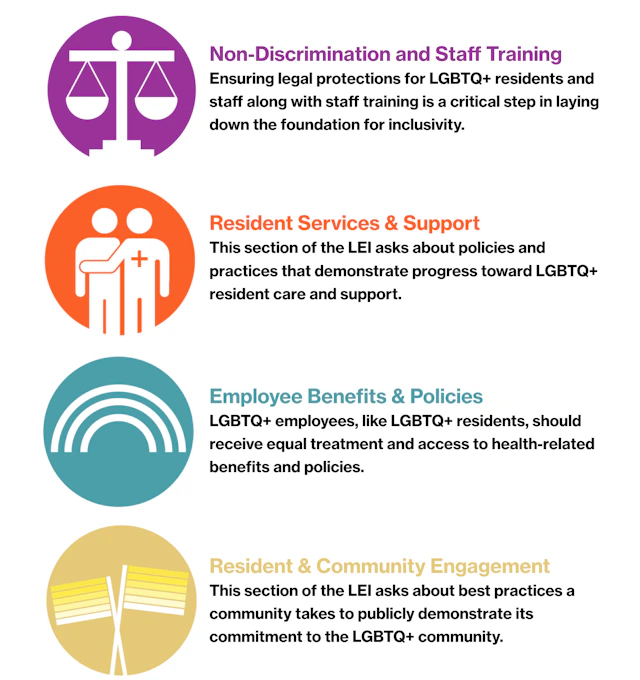
To accommodate the wide range of senior housing providers (i.e. skilled nursing communities, assisted living communities, affordable senior living apartments, etc.), the LEI offers a menu of best practices that organizations can reasonably implement. Every metric (LEI 2025 criteria) is quantitatively measurable and responses are validated.
How Participants are Recognized
Communities that have foundational LGBTQ+ inclusive non-discrimination policies and staff training (Criteria 1) are eligible to receive one of three tiers of recognition. See below for more information about each of the three LEI tiers of recognition.
Three Tiers of Recognition

LGBTQ+ Long-Term Care Equality Builder
At this tier, communities are beginning their journey and have a solid foundation of key non-discrimination policies that are codified and communicated. To achieve this tier, communities must have all Criteria 1 best practices in place and have completed staff training on LGBTQ+ aging. These best practices include an LGBTQ+ inclusive resident non-discrimination policy, equal visitation policy, and employee non-discrimination policy.

LGBTQ+ Long-Term Care Equality High Performer
At this tier, communities are further along in their inclusion journey. In addition to meeting the requirements for the Equality Builder tier, High Performer communities have adopted a minimum of practices in Criteria 2-4, the areas of Resident Services and Supports, Employee Benefits and Policies, and Resident and Community Engagement.

LGBTQ+ Long-Term Care Equality Leader
At this tier, communities have made significant progress in their inclusion journey. In addition to meeting the requirements for the prior two tiers, Equality Leader communities have integrated the majority of practices in Criteria 2-4, the areas of Resident Services and Supports, Employee Benefits and Policies, and Resident and Community Engagement. Equality Leader communities also demonstrate that their employees have access to at least one health plan that covers medically necessary health services for transgender people, including gender transition-related treatment.
“As our community embarked on creating a more purposeful culture of inclusion, we faced the question of how to do that. What does a more inclusive culture look like? Where do we even begin to focus? How do we hold ourselves accountable to our goals? Finding the LEI felt like finding a clearly lit path to our destination when we were meandering lost in the dark. The LEI Report, the objective goals and benchmarks, and resources provide a roadmap of how to get there.”
Executive Director, Emerald Heights

The LEI 2025 represents the second validated survey on LGBTQ+ inclusion in residential long-term care and senior housing communities. The Human Rights Campaign Foundation and SAGE are excited to present this report on the 274 communities from 33 states that actively participated in the LEI 2025 survey. This represents a significant growth of 37% in the number of communities that voluntarily completed the LEI survey.
All 274 participating communities deserve to be commended for their commitment to LGBTQ+ inclusion and their efforts to adopt the policies and practices that will make their LGBTQ+ residents, visitors, and employees feel safe and welcomed. Foremost among these policies and practices are the foundational non-discrimination policies found in Criteria 1 of the LEI, which calls for an LGBTQ+ inclusive Resident Non-Discrimination, Equal Visitation, and LGBTQ+ inclusive Employment Non-Discrimination Policy.

Ninety-nine percent of the communities that participated in the LEI 2025 demonstrated that they have updated their resident and employee non-discrimination policies to include protections based on sexual orientation and gender identity. This contrasts sharply with what we found when we researched these policies in long-term care communities for our LEI 2021 report. In that report, only 18% of the communities we researched published an enumerated resident non-discrimination policy that included both “sexual orientation” and “gender identity” in the policy, and only 36% had an enumerated employee non-discrimination policy that included these terms.
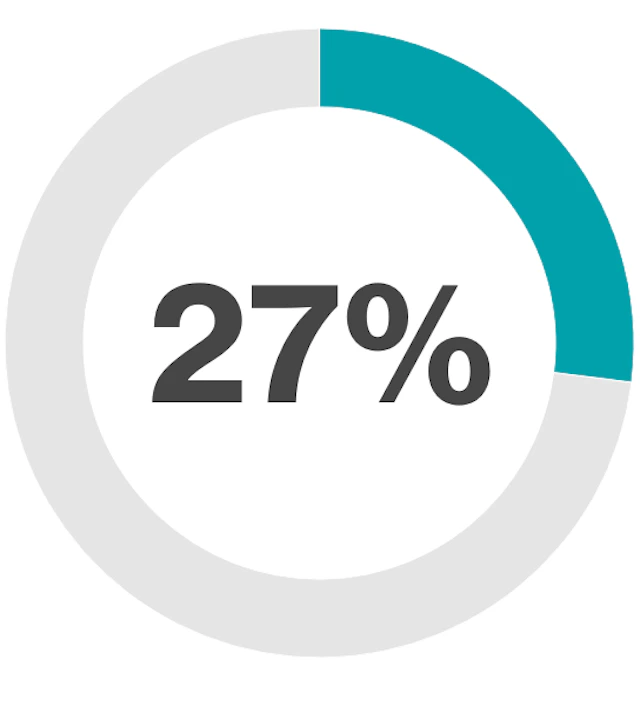
Beyond the foundational policies found in Criteria 1, LEI 2025, many participants demonstrated that they are also making progress in the remaining criteria sections, which include Resident Services and Support, Employee Benefits and Policies, and Resident and Community Engagement. 27% of participating communities earned either the High Performer or Leader designation, indicating that they are going beyond the basics and have adopted at least some of the policies and practices outlined in each criteria section.
While we celebrate these 274 communities and the progress that they have made on LGBTQ+ inclusion, we must acknowledge that we are releasing this report during an incredibly challenging time for the LGBTQ+ community. The hard work and dedication needed to ensure inclusive senior housing communities pushes forward in a sobering political climate. Increased, baseless attacks on diversity, equity, and inclusion efforts have resulted in a greater need to protect participating communities from being unfairly targeted. Therefore, the HRC Foundation and SAGE decided not to release individual scorecards in this year’s report.
During these challenging times, we encourage long-term care and senior housing communities to continue to use this unique and invaluable resource to enhance LGBTQ+ care and solidify their commitment to LGBTQ+ equity and inclusion. The HRC Foundation and SAGE look forward to welcoming them to the LEI in future years — and helping them extend a warm welcome to LGBTQ+ older people.
By The Numbers
LEI 2025 Participants at a Glance


Number of Participating Communities by Level of Care

Communities in 33 States



Kendal at Oberlin: Allyship in Action
Northern Ohio
A couple of years ago, “ALL ARE WELCOME” signs were hung at the two entrances of Kendal at Oberlin’s main building, but the seeds of welcoming diversity were planted many years earlier when the Northern Ohio Life Plan Community opened.
Kendal at Oberlin was founded in 1993 with intentional regard for the principles of the Religious Society of Friends, also known as Quakers. One of these values is “Welcoming Diversity,” which embraces residents and staff regardless of race, color, gender identity and expression, sexual orientation, religion, and national origin.
Kendal’s 30-plus-year journey to become one of the country’s leading retirement communities dedicated to equitable treatment and inclusion of LGBTQ+ residents and employees results from strong leadership, resident and staff engagement, and a community-wide commitment to mutual respect, acceptance, and teamwork.
Today, 350 people from over 30 states proudly call Kendal at Oberlin home.
Inclusion as a Value
“The vision of an inclusive and welcoming community has been part of Kendal’s values for decades and is one of the pillars of our current Strategic Plan. The LEI Survey created an opportunity for self-study of our procedures, messaging, and staff training as they are perceived by the LGBTQ+ community. We are so pleased to be recognized as a Leader in the LEI,” said Seth Vilensky, Chief Executive Officer.
In Kendal’s early years, like much of society in the 1990s, sexual orientation and gender identity were often a personal matter and not publicly shared or discussed. While Kendal welcomed gay residents since opening, Robert and Ted moved in 2003 and became the first openly gay couple.
At a “25 and Proud” event in 2018 celebrating Kendal’s 25th anniversary, Robert spoke about the community’s caring support.
“Ted and I have felt not just tolerated but truly embraced as valued members of this community. We gave you the gift of the opportunity for this to be so, and you gave us back the gifts of admiration, respect, and, may I even say, love. We will be forever grateful that this is the place where we will spend the rest of our lives,” Robert said.

Taking Action
Also at their anniversary event, a transgender couple who had recently moved into Kendal spoke of how warmly the Kendal community had welcomed them. Residents also announced the formation of an awareness, advocacy and support group for lesbian, gay, bisexual, transgender, and other gender non-conforming residents, staff and allies at Kendal.
Since then, the LGBTQ+ & Allies Special Interest Group, with strong support from the administration, the Kendal at Oberlin Residents Association (KORA) and its Board of Directors, has been a steadfast and an active voice for LGBTQ+ rights at Kendal and in the larger community.
LGBTQ+ & Allies activities at Kendal include:
- Training sessions with related organizations at Oberlin College and in Lorain County
- Letter-writing campaigns to the Ohio governor and legislators advocating for civil rights for LGBTQ+, most recently voicing its opposition to the Ohio Bathroom Bill. This legislation, which went into effect in February, mandates that students in public schools in Ohio be restricted to using restrooms associated with their biological sex assigned at birth without regard to their gender identity or gender expression. “This letter sent a strong signal that our community wanted to make Ohio a welcoming place for all seniors to spend their retirement years,” CEO Seth said.
- Movies, speakers, book clubs and workshops held throughout the year, with added emphasis during June Pride Month
During 2024 Pride Month the LGBTQ+ honored its 200+ Allies for “creating safe spaces, standing up for injustice and providing emotional support.” Kendal Allies show support in various ways, such as wearing rainbow hearts on their nametags and participating on LGBTQ+ committees.
One of the Allies is Frankie. She and her husband were considering other retirement communities but seeing a rainbow flag prominently displayed at the Kendal entrance “clinched it for us. Being allies is particularly important to us since we have a family member who belongs to the LGBTQ+ community.”
A Community for All
Kendal is proud of its diverse community and regularly includes stories and articles on its social media about residents and staff. Last year, when employees Luna and Sophie became engaged on Valentine’s Day Kendal posted a photo and article on its Facebook page.
“Kendal is a hugely accepting place – the residents, administration, all the employees. I really couldn’t ask for anything better,” said Luna, who is transgender. Click play to hear why they call Kendal at Oberlin, an LGBTQ+ Long-Term Care Equality Leader, home.
This year, the LGBTQ+ & Allies established task groups to enhance its advocacy and action. The group’s work benefits the entire community, not just LGBTQ+ residents and staff, says co-chairs Ann and Jesse.
“The LGBTQ+ presence widens people’s perspective and thinking. It signals to other groups that they are welcome as well. The more varieties of people in a community, the more exciting and vibrant it can be. Because of this vibrancy, acceptance and openness, seniors are attracted to Kendal and want to make it their home,” the co-chairs said.


Edenwald: Dedicated to Diversity
Towson, Maryland
Edenwald, located in Towson, Maryland, has a rich history spanning over a century. Originally founded in June 1881 as The General German Aged People’s Home of Baltimore, it began as a home for older German citizens. Known in its early years as The Greisenheim, the organization relocated to a modern facility in Baltimore’s Irvington neighborhood in 1936. In the 1980s, Edenwald merged with another care center and moved to its current location in Towson, situated on land purchased from Goucher College.
Today, Edenwald serves nearly 400 residents in its 18-story Tower and 12-story Terrace buildings, offering a range of amenities and services including a wellness center, indoor pool, and various dining venues. Governed by a diverse Board of Directors and led by a dedicated CEO and Leadership Team, the community’s core values—connection, respect, communication, engagement, and integrity—are central to its operation and its mission of providing high-quality care to a diverse group of residents.

A Journey to LGBTQ+ Inclusion
Edenwald’s journey toward LGBTQ+ inclusion began in 2019, driven by the collective vision of its Board of Directors, CEO Mark Beggs, and VP and Chief Information and Equity Officer David Brown. With a long-standing reputation for being a welcoming community, Edenwald recognized the need to formally extend its commitment to diversity and inclusion, including specific efforts to support the LGBTQ+ community. This led to the creation of the Diversity, Equity, Inclusion, and Belonging (DEIB) Committee, which now plays a central role in advancing Edenwald’s inclusion efforts.
A crucial component of this journey was the adoption of the Long-Term Care Equality Index (LEI), a tool designed to help organizations create safe, inclusive, and welcoming environments for LGBTQ+ older adults. For Edenwald, the LEI represents an essential branch in the organization’s broader tree of belonging. It’s a meaningful way to align the organization’s values with tangible actions that demonstrate their commitment to the LGBTQ+ community. The LEI is not just a checkbox but is integrated into Edenwald’s DEIB Business Goals, ensuring that LGBTQ+ inclusion remains a key focus in the organization’s ongoing efforts.

Advice for Other Communities
For communities looking to start or strengthen their inclusion efforts, Edenwald offers valuable advice. First and foremost, organizations must make a clear, unwavering commitment to inclusion. This involves defining what inclusion means to the organization and aligning it with the organization’s mission and values, providing a solid foundation for future efforts.
Leadership plays a pivotal role in driving inclusion. It’s not enough for leaders to just endorse the initiative; they must actively participate, model inclusive behavior, and hold others accountable for maintaining inclusive practices. Inclusion should be seen as a priority at all levels of the organization. Inclusion is not limited to race or gender—it encompasses diversity of perspectives, abilities, backgrounds, and experiences. Edenwald encourages organizations to build leadership teams that reflect the diversity of the people they serve. Representation is crucial to ensuring that everyone feels seen and heard.
Additionally, inclusion should be viewed as a continuous process, not a one-time effort. Regular training to raise awareness about unconscious bias, microaggressions, and cultural competency helps foster a culture of constant growth. Encouraging open, honest conversations where individuals can share their experiences and feelings without fear of judgment is essential.
Jan Carver and Norma Long met in 1986 and have been together since. Like many people, Jan and Norma wanted to spend their retirement years near their friends and family while ensuring their future care needs are met. Click play to hear why they call Edenwald, an LGBTQ+ Long-Term Care Equality Leader, home.
Looking to the Future: Edenwald’s Vision
Edenwald aims to foster a more diverse, inclusive, and equitable community that fuels long-term, sustainable change. Looking ahead to the next 3-5 years, Edenwald envisions its DEI initiatives becoming deeply embedded in its organizational culture. The goal is to create an environment where diversity, inclusion, and community engagement are seamlessly integrated into daily life, and where residents, staff, and leadership alike feel respected, valued, and connected.
To achieve this, Edenwald is focused on cultivating a culture of inclusion with clear, measurable outcomes. Regular assessments of community members’ experiences, continuous DEI training, and close alignment of DEI initiatives with broader organizational goals will support this vision.
Edenwald also plans to expand its DEI efforts beyond internal policies, partnering with community organizations and diverse suppliers to drive progress in the wider community. A major milestone in Edenwald’s development is its partnership with Goucher College to create Maryland’s first university retirement community. This exciting collaboration will offer residents access to academic resources and cultural opportunities, with the expansion set to open in early 2029.

THE LONG-TERM CARE EQUALITY INDEX 2025 ASKED PARTICIPANTS a series of questions about LGBTQ-inclusive policies and practices in senior housing. Those questions are divided into four criteria sections. Responses to the criteria are reported in aggregate to indicate national trends and facilitate benchmarking.
- Criteria 1 - Non-Discrimination and Staff Training
- Criteria 2 - Resident Services and Support
- Criteria 3 - Employee Benefits and Policies
- Criteria 4 - Resident and Community Engagement
Responses to the criteria are reported in aggregate to indicate national trends and facilitate benchmarking.

Criteria 1: Non-Discrimination and Staff Training
The Non-Discrimination and Staff Training criterion represents policies and practices that are considered foundational to LGBTQ+ resident-centered care.
Resident Non-Discrimination
The first section of the LEI Non-Discrimination and Staff Training criteria calls for a written resident non-discrimination policy (or residents’ bill of rights) that includes both “sexual orientation” and “gender identity.” LGBTQ+ people experience many forms of discrimination in senior housing care because of their sexual orientation and/or their gender identity or expression. An explicitly LGBTQ+ inclusive resident non-discrimination policy can do much to reduce the discrimination that LGBTQ+ residents experience and fear. Learn more about this criterion in the LEI Resource Guide.

97% of LEI participants with an LGBTQ+ inclusive resident non-discrimination policy documented that the policy is readily accessible and communicated to patients in at least two different ways and 94% documented that the policy is readily accessible and communicated to staff in at least one way.
Equal Visitation
The second section of the LEI Non-Discrimination and Staff Training criteria calls for a written visitation non-discrimination policy or an equal visitation policy. The federal government requires that all long-term care communities that accept Medicare or Medicaid payments ensure that residents are granted certain rights and protections, including the right to spend time with visitors of their choice. Learn more about this criterion in the LEI Resource Guide.

94% of LEI participants with an equal visitation policy documented that the policy is readily accessible and communicated to residents in at least two different ways and 85% documented that the policy is readily accessible and communicated to staff in at least one way.
Employment Non-Discrimination
The third section of the LEI Non-Discrimination and Staff Training criteria calls for an employment non-discrimination policy (or an equal employment opportunity policy) that includes both “sexual orientation” and “gender identity.” LGBTQ+ people continue to face discrimination in employment because of their sexual orientation and/or gender identity, creating a need for explicit non-discrimination policies. Learn more about this criterion in the LEI Resource Guide.

99% of LEI participants with an LGBTQ+ inclusive employee non-discrimination policy communicated the policy publicly.
Staff Training in LGBTQ+ Resident-Centered Care
The fourth section of the LEI Non-Discrimination and Staff Training criteria calls for key facility employees to receive expert training in LGBTQ+ resident-centered care. This criterion recognizes that training is critical for policies to be successful and for LGBTQ+ residents to feel welcome. Learn more about this criterion in the LEI Resource Guide.


Criteria 2: Resident Services and Support
This criteria section includes a wide variety of best practice recommendations drawn from federal nursing home regulations under the Centers for Medicaid and Medicare Services (CMS), guidance from the National Long-Term Care Ombudsman Program, and additional research and reports regarding the needs of LGBTQ+ older people living in long-term care and senior housing communities.
The LEI Participants demonstrated progress towards numerous policies and practices that promote and support the inclusion of LGBTQ+ residents. However, there are also some policies and practices where there is significant room for growth. For example, many policies could be made LGBTQ+ inclusive with the thoughtful addition of sexual orientation and gender identity to the enumerated lists of protected residents.









For more information about best practices for care of transgender residents see the publication, Creating Equal Access to Quality Health Care for Transgender Patients: Transgender-Affirming Hospital Policies, from HRC Foundation, Lambda Legal, and the LGBT Rights Committee of the New York City Bar Association. While created for hospitals, these sample policies can easily be adopted for any residential care setting.
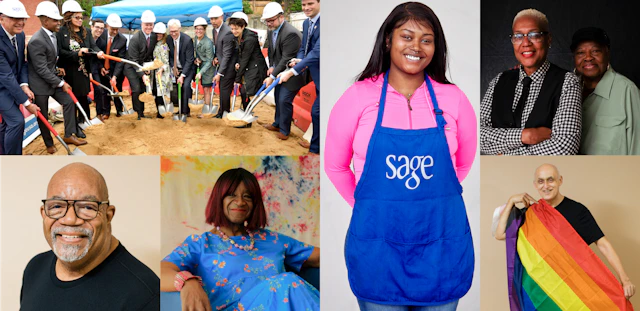
Criteria 3: Employee Benefits and Policies
This criteria section is designed to familiarize communities with best practices to promote equity and inclusion for LGBTQ+ employees. It is critical that LGBTQ+ employees, like LGBTQ+ residents, receive equal treatment, particularly vis-à-vis health-related benefits and policies.
Equal Benefits
Competitive employer-provided benefits packages are critical to attracting and retaining talent. Providing LGBTQ+ employees and their families with inclusive benefits, from healthcare coverage to retirement investments and more, is a low-cost, high-return proposition for businesses. HRC Foundation and SAGE strongly urge employers to maintain domestic partner benefits for their workers as a sign of sustained commitment to family diversity, inclusion and protection of LGBTQ+ employees whose rights outside the workplace are not guaranteed under law in many states. Domestic partner benefits ensure that all employees will be treated equally.
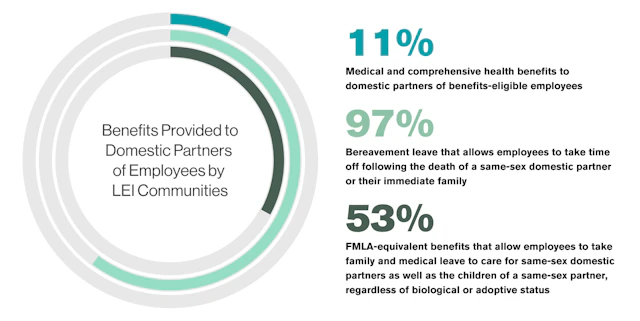
Transgender Inclusive Healthcare Benefits
Access to healthcare benefits that cover gender-affirming care are critical for the health and well-being of transgender people. To receive credit for this criterion, which is necessary to obtain LEI Leader status, participants must provide to all employees at least one health plan that explicitly covers medically necessary health services for transgender people, including gender transition-related treatment and these benefits must be communicated to employees as a covered benefit.

Download our whitepapers for more information on important LGBTQ+ benefits issues:
Other Support for LGBTQ+ Employees
In addition to providing equal benefits, there are a number of other ways that employers can be inclusive of and supportive of their LGBTQ+ employees.
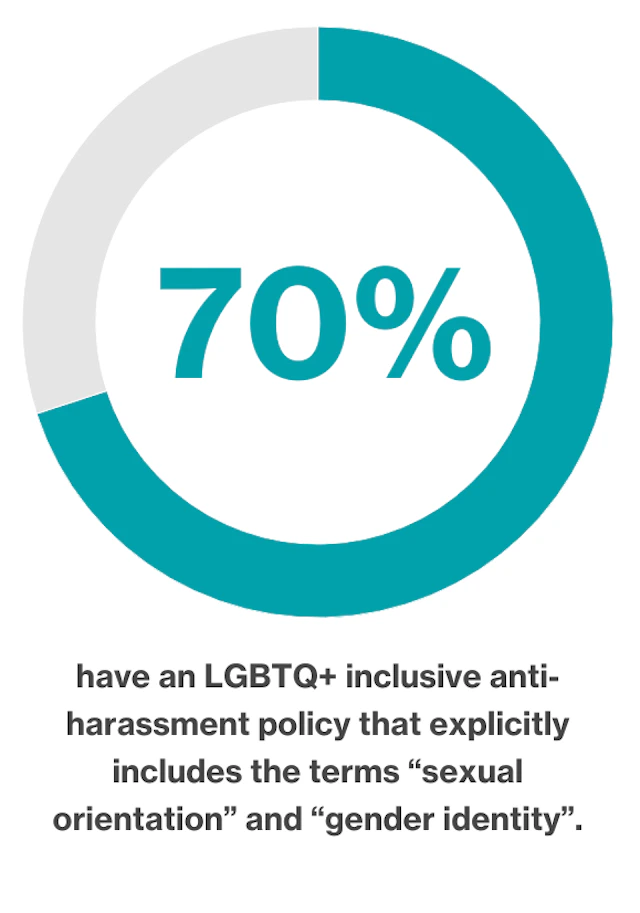



Transition Guidelines
In addition to ensuring healthcare coverage for gender-affirming care, one of the most important policies an employer should have is a set of written gender transition guidelines that document the necessary policies and practices in place to support a respectful and successful workplace transition.

The HRC Foundation’s Transgender Inclusion in the Workplace: A Toolkit for Employers is a comprehensive resource to guide employer transgender inclusion. The toolkit includes HRC’s best practice advice for implementing transgender-inclusive policies and practices (including sample policies) as well as guidance for implementing transgender-inclusive healthcare benefits.

Criteria 4: Resident and Community Engagement
This criteria section helps senior housing communities understand the needs of LGBTQ+ residents and community members and focuses on outreach and promotion to the LGBTQ+ community to let them know that the organization is a welcoming and affirming community.





While marketing and advertising to the LGBTQ+ community can be an important outreach tool, a long-term care or senior housing community should not do this without first ensuring that it has the foundational policies and practices in place for LGBTQ+ inclusion. During the LEI research and survey review process it was not uncommon to find that a senior housing community would include LGBTQ+ visual symbols like a pride flag on their website to indicate that they were inclusive, yet upon review of their non-discrimination policies we found that they had not been updated to be LGBTQ+ inclusive. We encourage older LGBTQ+ people or those caring for them to look beyond the website symbols and ask a community about the policies and practices that make them LGBTQ+ inclusive. Learn more in our consumer guide on Finding an LGBTQ+ Inclusive Long-Term Care Community.

The LEI Advisory Council
Members of the Long-Term Care Equality Index Advisory Council serve as key advisors in the development and implementation of the LEI. The Advisory Council is made up of a diverse selection of senior housing professionals, aging policy experts and LGBTQ+ policy experts.
Kimberly Acquaviva, PhD, MSW, CSE, FNAP
Betty Norman Norris Endowed Professor
University of Virginia School of Nursing
Loree Cook-Daniels
Policy and Program Director
FORGE, Inc.
Gene Corpuz, MSPH
Dignity USA/Honolulu
Joan Devine, RN
Culture Change Expert
Ben de Guzman
Director
DC Mayor’s Office on Asian and Pacific Islander Affairs
Chien Hung, MSW, MA-G
Director, Long-Term Care Ombudsman Program
VOYCE St. Louis
Wilfred Labiosa, PhD, MS
CEO
Waves Ahead Puerto Rico
Bruce J. Lederman, JD
President/CEO
Charles E. Smith Life Communities
Rev. Beth Long-Higgins,
Vice President of Engagement & Director
Ruth Frost Parker Center for Abundant Aging, United Church Homes
Amity Overall-Laib,
Director
National Long-Term Care Ombudsman Resource Center
Lindsay Schwartz, PhD,
Founder & Principal
Workforce & Quality Innovations, LLC
Ames Simmons, JD
Policy Consultant, Attorney, and Educator
Rabbi Erica Steelman, MAHL, MPP,
Healthcare Chaplain, Consultant, and Educator
Jill Lyle Sumner, MPH, MBA
Founder & Principal
Lyle Health Advisors
Cornelius Wilson
Senior Housing Coordinator
The City of Detroit
Imani Woody, PhD
Founder & President/CEO
Mary’s House for Older Adults, Inc.
The LEI Team would like to thank Robert Espinosa, Sarah Jen, and Nate Sweeney for their past service to the LEI Advisory Council.
The LEI Team
The Long-Term Care Equality Index is a project of the Health & Aging Program at the Human Rights Campaign Foundation and SAGE.

Tari Hanneman, HRC, Senior Director, Research & Education
Tari Hanneman (she/her) is the Senior Director of Research & Education at the Human Rights Campaign. In this role she oversees both the Healthcare Equality Index and the Long-Term Care Equality Index in addition to other research and education projects. Tari has more than 30 years of experience in the nonprofit and philanthropic sector, primarily focused in the areas of health and women’s issues. She holds a master’s degree in public administration with an emphasis on nonprofit management from the University of Southern California, where she also did her undergraduate work – Fight On!

Dan Stewart, HRC, Deputy Director, Research & Education
Dan Stewart (he/him) is the Deputy Director of Research and Education at the Human Rights Campaign. In this role, he provides leadership and management for the Long-Term Care Equality Index and other projects to promote LGBTQ+ inclusive policies and practices in long-term care and aging services. Dan received his BA in Psychology from Saint Louis University and an MS in Gerontology from the University of Missouri-St. Louis. He is a third cohort Fellow of the American Society on Aging’s ASA RISE program.

Shannon Touhey, HRC, Senior Manager, Research & Education
Shannon Touhey (she/her) is the Senior Manager of Research and Education at the Human Rights Campaign. In this role, she manages the LEI database and the survey development process, works on survey reviews, and fields questions from long-term care communities nationwide about the LEI. She holds a bachelor’s degree in public health and sociology from American University.

Sherrill Wayland, SAGE, Director, National Resource Center on LGBT Aging
Sherrill Wayland (she/they) is the Senior Director of Special Initiatives and Partnerships, for SAGE (providing Advocacy & Services for LGBTQ+ Elders), where Sherrill serves as a trusted thought partner to national initiatives team members and SAGE staff across the organization. They lead the National Resource Center on LGBTQ Aging, serve as SAGE lead for the Long-Term Care Equality Index (in partnership with the Human Rights Campaign Foundation), and work in close partnership with SAGECollab, SAGECare, the National Housing Initiative, and the Diverse Elders Coalition. Sherrill earned a Master of Social Work degree from the Brown School of Social Work, Washington University in St. Louis, and has over 30 years of professional experience in the fields of education, disability, and LGBTQ+ older adult advocacy.
Special Thanks
Thank you to HRC Equality Programs Senior Vice President, Ellen Kahn, and former HRC Foundation Senior Vice President, Orlando Gonzalez, for their support and guidance.
Thank you to SAGE Chief Executive Officer Michael Adams, Executive Vice President, Lynn Faria, and Chief Experience Officer, Christina Da Costa, for your visionary leadership and guidance. A special thank you to the entire SAGECare team, Alex Kent, Data Specialist, Chaela Carter, Client Services Specialist, Karen Cushing, SAGECare Business Development Manager, Pam Bolton, Managing Director of Social Enterprise, Nicole Paggett, Assistant Director of Data Strategy, and Sadiya Abjani, Director of Training and Instructional Design for their support in developing and hosting the LEI Executive Briefing and promotion of the LEI among SAGECare Credentialed Long-term Care Communities.
Thank you to the HRC’s Data and Analytics Team for all of the assistance in maintaining the LEI data with a special shout-out to Alec Carrasco, who always finds a way to make it work. Thanks to the team at Heller Consulting who built the database behind the LEI and continue to help us improve upon it.
Thank you to Robert Villaflor and Josette Matotto for design guidance and support.
The LEI 2025 was designed by Tony Frye Design.
Our Funders
The HRC Foundation and SAGE are grateful for the support of these funders.

“We are grateful to continually participate in the Long-Term Care Equality Index (LEI) process, which outlines the gold standard for LGBTQ+ -affirming health care practices in long-term care facilities. We utilize the LEI as a reflection tool, allowing us to ensure our long-term care facilities and system continue to provide culturally competent and responsive care for older LGBTQ+ adults.”
Director for LGBTQ+ Equity, NYC Health + Hospitals

Interested in participating in the LEI 2027?
Sign the Commitment to Caring Pledge today.
Love conquers hate.

Wear your pride this year.
100% of every HRC merchandise purchase fuels the fight for equality.



